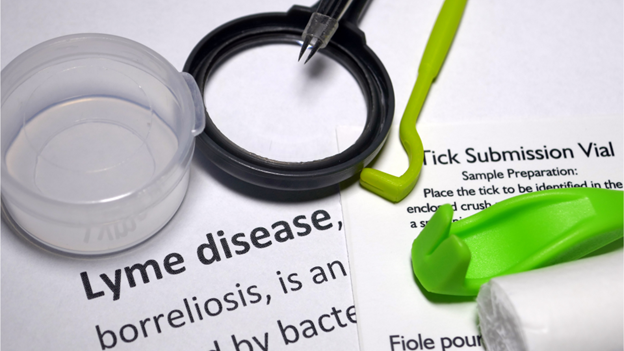
Can Lyme disease be cured? Debunking five Lyme disease myths
If you've ever heard about Lyme disease, you probably know it's a tick-borne illness that can cause serious health challenges. There are plenty of myths and misunderstandings about this condition.
We'll set the record straight and debunk some of the most common myths surrounding Lyme disease. Plus, we'll answer an important question on everyone’s mind: can Lyme disease be cured?
But first, let’s explain what you need to know about Lyme disease.
What is Lyme disease?
Lyme disease is a tick-borne illness caused by the bacterium Borrelia burgdorferi. Lyme disease transmits through the bite of infected ticks.
If you get bitten, you might develop symptoms like the signature rash called erythema migrans — though not everyone gets it — and flu-like feelings like fatigue, fever, headache, muscle aches, and swollen lymph nodes.
If left untreated, Lyme disease can bring more serious problems like severe headaches, stiff neck, facial paralysis, heart palpitations, dizziness, and memory issues.
Early detection and proper treatment are key to managing Lyme disease effectively and preventing complications.
Medical professionals at your local CityMD urgent care can help you manage symptoms and treat the effects of Lyme disease.
Lyme disease myths
Let's unpack some common Lyme disease myths.
Myth 1: Lyme disease is easily diagnosed and always comes with a bullseye rash.
Contrary to popular belief, Lyme disease can be challenging to diagnose. The bullseye rash appears in only about 70-80% of cases.
Many people with Lyme disease experience diverse symptoms that may mimic other conditions, making accurate diagnosis a bit tricky.
Myth 2: Once you have Lyme disease, it can never be cured.
Good news. Lyme disease can often be treated and cured with early detection and appropriate treatment. The standard treatment involves a course of antibiotics, which helps eliminate the infection.
Promptly seek medical attention for the best chances of a full recovery.
Myth 3: You can only get Lyme disease from deer ticks.
While deer ticks are common carriers of Lyme disease, they are not the only ones.
Other species of ticks, like the black-legged or the western black-legged tick, can transmit the bacteria. Be cautious and take preventive measures regardless of the tick species you find.
Myth 4: Lyme disease is only a concern in certain regions.
Lyme disease pops up in many areas, both rural and urban. It's not exclusive to specific regions or countries.
Ticks, whether carried by migratory birds, pets, or even humans traveling, allow the disease to spread to new areas. Be aware of the risk, no matter where you are.
Myth 5: If you don't recall being bitten by a tick, you can't have Lyme disease.
Tick bites can often go unnoticed, especially when ticks are in their nymph stage, as they are tiny and can attach discreetly.
So, even if you don't remember a tick bite, it doesn't rule out the possibility of Lyme disease. Symptoms and medical evaluation play a crucial role in determining the presence of the infection.
Is Lyme disease fatal?
The good news is that, in general, Lyme disease isn't fatal. With appropriate treatment, most people can fully recover. However, you need to take the disease seriously.
Severe complications are rare but can occur if you leave Lyme disease untreated. These complications may affect the heart, joints, or nervous system. Early diagnosis and proper treatment greatly reduce the risk of complications.
If you suspect Lyme disease or experience symptoms after a tick bite, seek medical attention promptly. Healthcare professionals can thoroughly evaluate and guide you toward the right treatment.
Diagnosing and treating Lyme disease at CityMD
Have you been exposed to ticks or have symptoms consistent with Lyme disease? Our experienced healthcare professionals are here to help. We offer comprehensive evaluations, accurate diagnoses, and personalized treatment plans to ensure the best possible outcomes for our patients.
Remember, prevention is key. Be proactive in tick bite prevention, perform regular tick checks, and seek prompt medical attention if you suspect you may have Lyme disease.
CityMD is your partner in health. We're here to provide guidance, diagnosis, and treatment if you have any tick-related concerns. Just walk in. No appointment is needed.

We’re ready to care for you.
Visit any CityMD urgent care location in your community today for an evaluation with one of our expert providers.